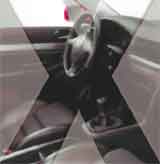Green transport
 considering the growing dependence of urban populations on motor vehicles and given the bleak scenario of fast depleting and increasingly expensive oil, the world is desperate for less fuel consuming, more efficient and less polluting cars. From 1973 to 1986, the average American car became twice as efficient, from consuming 17.8 litres per 100 km to 8.71 litres for the same distance. Since then, however, fuel efficiency has risen by only 10 per cent or so.
considering the growing dependence of urban populations on motor vehicles and given the bleak scenario of fast depleting and increasingly expensive oil, the world is desperate for less fuel consuming, more efficient and less polluting cars. From 1973 to 1986, the average American car became twice as efficient, from consuming 17.8 litres per 100 km to 8.71 litres for the same distance. Since then, however, fuel efficiency has risen by only 10 per cent or so.
Why is this happening? It seems the best automobile engineers of the world became so specialised that none of them could design an entire car by himself. Crucial integration between design elements has been lost. Too much thinking is going into each little piece and too little on the car as a whole. So, if a simple alteration in wheel design could place a lesser demand on the engine, the wheel designer cannot do it because engine design is not his area. Simple modifications like front-wheel drive, four valves per cylinder, overhead cams, five-speed overdrive transmission and retracting brake callipers that can save 35 per cent fuel have not been integrated by many car manufacturers.
There have been exceptions though. A number of Japanese auto manufacturers and some leading American and European ones have improved car designs, increasing fuel efficiency and making the car components recyclable. In 1992, Honda released a model that used only 4.62 litres of fuel per 100 km. Companies like Toyota and Ford have come up with electric or hybrid electric/gasoline driven models that double fuel efficiency and have low emissions.
New designs and technologies are gradually doing away with the basic concept that cars have to be made of steel and other metal alloys. Steel is heavy. Accelerating a heavy vehicle needs a big engine and wastes energy. Using ultrastrong crash-resistant materials like advanced composites or carbon
Related Content
- Order of the National Green Tribunal regarding discharge of untreated water, waste into Gandhi Sagar lake, Bhilwara, Rajasthan, 16/01/2025
- Order of the National Green Tribunal regarding medical waste from Kerala dumped in Tamil Nadu, 19/12/2024
- Affidavit by Maharashtra Pollution Control Board regarding dumping of garbage in and around Mahim railway station tracks, Maharashtra, 12/12/2024
- Order of the National Green Tribunal regarding heavy air pollution in Wagholi area of Pune, Maharashtra, 03/12/2024
- Inspection report of the joint committee on Nabinagar Super Thermal Power Station and Bhartiya Rail Bijlee Company, Nabinagar, Aurangabad, 26/11/2024
- A comparison of the life-cycle greenhouse gas emissions from combustion and electric heavy-duty vehicles in India
